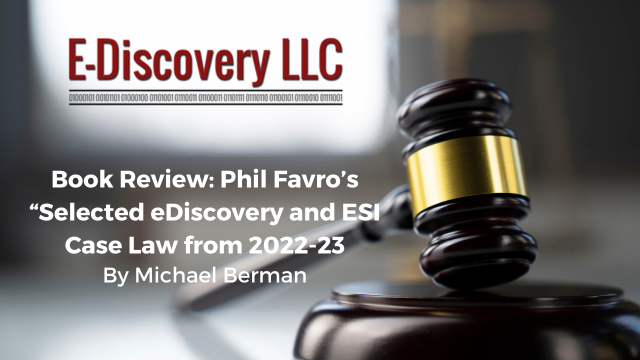 Image, Kaylee Walstad, EDRM
Image, Kaylee Walstad, EDRM
Phil Favro and The Sedona Conference have released “Selected eDiscovery and ESI Case Law from 2022-23” (2023). This is a sequel to Phil’s 2021-22 publication. I wrote that the prior book was “an excellent resource in an always-changing field.”[1]
As in the prior work, Phil’s new publication runs the gamut of topics and hits the important ones. Each case summary is clear and to-the-point. Summaries are organized by topic, such as cooperation, discovery of databases, Fed.R.Evid. 502, search methodology, ethics, and ESI Protocols, among many others.
I’ll give only two examples.
First, Phil described Fluor Fed.Sols., LLC v. BAE Sys. Ordnance Sys., Inc., 2023 WL 1871107 (W.D. Va. Feb. 7, 2023). There, a tardy production occurred after defendant’s electronic discovery provider ‘mistakenly de-duplicated documents against its entire database, instead of using the specific environment with documents to be produced; thereby incorrectly excluding the documents from production as ‘duplicates.’” Phil wrote about the value of voluntary disclosure of errors:
Despite the issue of vendor error, the court reasoned that defendant took appropriate steps to remediate any harm by both notifying plaintiff and the court of the underproduction of documents and then making a speedy production of the 79,000 documents. Sanctioning defendant under this circumstance, reasoned the court, would ‘only serve to discourage parties from disclosing and addressing discovery errors in the future.’” [emphasis added].
Phil Favro, Innovative Driven
“Despite the issue of vendor error, the court reasoned that defendant took appropriate steps to remediate any harm by both notifying plaintiff and the court of the underproduction of documents and then making a speedy production of the 79,000 documents. Sanctioning defendant under this circumstance, reasoned the court, would ‘only serve to discourage parties from disclosing and addressing discovery errors in the future.’” [emphasis added].
Phil has previously written about the value of voluntary disclosure. P. Favro, “New Federal Cases Spotlight 2021’s Key Trends in E-Discovery” (Law.com May 13, 2021).[2] This is an important concept.
Second, Phil described an important ethical obligation, writing: “Am. Consol. Indus., Inc. v. Blasingim, No. 1:19-CV-137, 2022 WL 17687491 (N.D. Ohio Dec. 15, 2022). In this complex trade secret case involving various discovery disputes, the court cited Sedona Principle Six for the proposition that the party responding to discovery must properly supervise its discovery vendor and—in connection with that process— ensure that ‘its directions to the vendor are complete and accurate.’ Against this backdrop, the court criticized a defendant (Liberty Steel) for failing to effectively ‘coordinate with its ESI vendor to ensure application of the correct search terms,’ which ‘required ‘do-over’ discovery, and kept a significant volume of responsive information from Plaintiffs.’” [emphasis added]. That is an important “lesson learned.”
I learn something new every time I read one of Phil’s blogs or publications. For example, he has been a guest blogger for Prof. Eric Goldman. Messaging Apps Raise Tricky E-Discovery Issues (Guest Blog Post) – Technology & Marketing Law Blog (ericgoldman.org)(May 16, 2022), and has written Solving the Privilege Conundrum | Practical Law The Journal | Reuters (Feb. 2023).
Phil’s Sedona Conference biography states that he “is a leading expert on issues relating to the discovery of electronically stored information. Phil serves as a court-appointed special master, expert witness, and trusted advisor to law firms and organizations on matters involving electronic discovery and ESI. He is a nationally recognized scholar on electronic discovery, with courts and academic journals citing his articles. Phil also regularly provides training to judges on electronic discovery and ESI….”
“Selected eDiscovery and ESI Case Law from 2022-23” is well worth reading. It was an honor to be listed as one of several people who contributed. Phil’s excellent blog can be found at Philip Favro, Author at Innovative Driven (driven-inc.com).
[1] Sedona Conference “Selected eDiscovery and ESI Case Law from 2021-22”
[2] See also Damage Control Method.